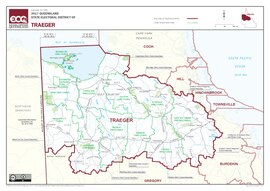Electoral district of Traeger
| Traeger Queensland—Legislative Assembly | |||||||||||||||
|---|---|---|---|---|---|---|---|---|---|---|---|---|---|---|---|
 Map of the electoral district of Traeger, 2017 | |||||||||||||||
| State | Queensland | ||||||||||||||
| Dates current | 2017–present | ||||||||||||||
| MP | Robbie Katter | ||||||||||||||
| Party | Katter's Australian | ||||||||||||||
| Namesake | Alfred Traeger | ||||||||||||||
| Electors | 26,386 (2020) | ||||||||||||||
| Area | 428,911 km2 (165,603.5 sq mi) | ||||||||||||||
| Demographic | Remote and rural | ||||||||||||||
| Coordinates | 19°49′57″S 142°38′52″E / 19.8326°S 142.6477°E | ||||||||||||||
| |||||||||||||||
Traeger is an electoral district of the Legislative Assembly in the Australian state of Queensland. It was created in the 2017 redistribution, and was named after Alfred Traeger, inventor of the pedal-powered radio, which was a significant contribution to people living in remote and rural communities in Queensland, such as those within Traeger.[1]
It takes in most of the urbanised portions of the abolished districts of Mount Isa and Dalrymple. It includes the local government areas of Burke, Doomadgee, Carpentaria, Croydon, Etheridge, Charters Towers, Mount Isa, Cloncurry, McKinlay, Richmond and Flinders.[1]
From results of the previous 2015 election, Traeger was estimated to be a safe seat for the Katter's Australian Party with a margin of 16.1%.[2]
Robbie Katter, the last member for Mount Isa and the Queensland leader of Katter's Australian Party, opted to follow most of his constituents into Traeger. He won the seat with an increased majority.
Members for Traeger
[edit]| Member | Party | Term | |
|---|---|---|---|
| Robbie Katter | Katter's Australian | 2017–present | |
Election results
[edit]| Party | Candidate | Votes | % | ±% | |
|---|---|---|---|---|---|
| Katter's Australian | Robbie Katter | 12,047 | 58.85 | −7.37 | |
| Labor | James Bambrick | 4,219 | 20.61 | +4.02 | |
| Liberal National | Marnie Smith | 3,284 | 16.04 | +5.99 | |
| Greens | Kristian Horvath | 460 | 2.25 | +0.10 | |
| Independent | Craig Scriven | 277 | 1.35 | −0.31 | |
| United Australia | Phillip Collins | 182 | 0.89 | +0.89 | |
| Total formal votes | 20,469 | 97.00 | +0.95 | ||
| Informal votes | 633 | 3.00 | −0.95 | ||
| Turnout | 21,102 | 79.97 | −2.07 | ||
| Notional two-party-preferred count[a] | |||||
| Liberal National | Marnie Smith | 51.20 | |||
| Labor | James Bambrick | 48.80 | |||
| Two-candidate-preferred result | |||||
| Katter's Australian | Robbie Katter | 15,295 | 74.72 | −3.77 | |
| Labor | James Bambrick | 5,174 | 25.28 | +3.77 | |
| Katter's Australian hold | Swing | −3.77 | |||
See also
[edit]- Electoral districts of Queensland
- Members of the Queensland Legislative Assembly by year
- Category:Members of the Queensland Legislative Assembly by name
References
[edit]- ^ a b Queensland Redistribution Commission (26 May 2017). "Determination of Queensland's Legislative Assembly Electoral Districts" (PDF). Queensland Government Gazette. p. 209. Archived from the original (PDF) on 29 October 2017. Retrieved 29 October 2017.
- ^ Green, Antony. "2017 Queensland Redistribution". ABC Elections. Archived from the original on 4 November 2017. Retrieved 5 November 2017.
- ^ 2020 State General Election – Traeger – District Summary, ECQ.
- ^ "Analysis of the 2020 Queensland Election Result". 18 November 2020.
Notes
[edit]- ^ Estimate two-party preferred count by Antony Green.[4]
